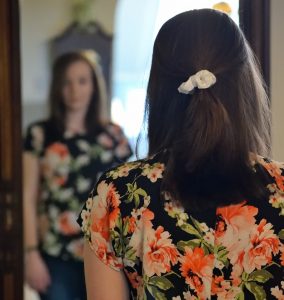By Jessica A. Wegener RD, CSSD, LMNT | Owner Positive Nutrition of Omaha LLC
I began thinking about writing this blog and did a quick Google search to see what others are saying about body image. I came across a few definitions and descriptions that really intrigued me and made me start thinking a bit differently about body image too.
Some thoughts on what body image:
- The perception one has of their physical self and the thoughts and feelings that result from that perception. Thoughts can be both positive and negative and are influenced by the individual and environmental factors around them.
- The mental representation we create, which may not bear any relation to how others actually view us!
- Body image does not develop in isolation. Our culture, family and friends convey positive and negative messages about our bodies.
A Metaphor for Body Image Distortion
A mentor once described body image distortion to me with an airplane analogy. The body is the airplane, the control panel is the brain, the pilot sees a warning light go off that something is wrong with the landing gear, the pilot turns the plane around takes it into the mechanic and the mechanic reports that nothing is wrong. The plane (body) is fine, but the control panel (brain) is perceiving that something is wrong, when really nothing has changed. The body (plane) hasn’t changed and is fine, but our brain (control panel) is then telling us something has changed, and we look different or wrong.
German researchers Hewig et al (Psychosomatic Medicine, 2008) note that body image has two elements, the mental image, i.e., perceived size and shape of one’s body and the emotional aspect of feelings and beliefs. Furthermore, there can be perceptual distortions and actual body dissatisfaction (i.e., actual negative feelings about one’s body or parts of it.) Didie et al (Body Image, 2010) note that the concept of body image is “multi-dimensional and encompasses perceptions, thoughts, feelings, and behaviors not only about physical appearance” but also about fitness and health.
 Body Image Challenges
Body Image Challenges
Body image is difficult, and the current diet and body obsessed culture we live in is not helping, then add in trying to recover from disordered eating. For some, body image was made a focal point throughout their life from a young age, others could be later in life but either way, it is hard!
Body image can be constantly changing and there are many factors that affect how we perceive our own body. The body changes with age, and illness, accidents, stress, hormones and surgeries can all make a difference in body image. For example, it’s finals week for quite a few of my client’s as I write this, and they are dealing with high levels of stress. Believe it or not stress can cause poor body image. (Murray et al, Journal Adolescence 2011). We can feel this stress in our body, the stress can also cause gastrointestinal distress which, for some people, leads them to feel bloated or constipated and trigger negative body image.
Normal Changes in Our Bodies
Most females are aware of that one week a month, that causes water retention and bloating which can cause poor body image too. Right before menses progesterone levels drop, some people are more sensitive to this drop and it can trigger more depressive type emotions. This combined with acne and bloating, can lead to perceived negative view of our bodies. Even traveling can change our bodies and how we feel. Flying on an airplane leads to dehydration, fluid retention and bloating in the body and what’s one of the first things people do when they get home from traveling… they weigh themselves! Highly not recommended, as almost every person will likely gain weight while traveling despite any changes in the way they eat while they travel. So, no weighing after traveling, actually I highly recommend you never weigh yourself at home (Maybe my next blog topic?)!
Body Image Does Not Discriminate Against Men
Body image is not just a female issue, it effects all genders. The male population is being triggered by Hollywood, in the past three years, 4 out of the top 10 grossing movies are based on superheroes, that are muscular and strong or the handsome fellow who always gets the fairytale ending. Then there are the social media triggers, Instagram reports 43% of their posts are selfies or videos of people at the gym working out. The media tells men that they should be lean, strong, and muscular. But the male body image struggle is about more than the shape of their bodies. Men are figuring out how to deal with hair loss, height perception, genital size and skin care. The transgender folks have likely being dealing with body image due to the identity struggle since they were born.
All Sizes Struggle with Body Image
What is the relationship between body image and body size? Both higher and lower weight bodies are affected, however lower weight in particularly as seen in anorexia nervosa, can dramatically distort body image. For example, part of the very definition of anorexia nervosa includes a “disturbance in the way in which one’s body weight or shape is experienced,” (DSM-5, 2013) but any eating disorder, including bulimia and binge-eating disorder, can include significant preoccupations and overvaluation of our shape and weight and a failure to perceive our body accurately. (Grilo, International Journal of Eating Disorders, 2013). Body image distortion can affect anyone, it is the extent to which we allow our brain to put emphasis on the parts of the body that can make a difference. The question then becomes what you can do to help improve body image. Here are some tips to try…
Tips for Better Body Image
- Spend less time in front of mirrors, take a quick check in the morning to make sure you like your hair, make-up, clothes, etc… If you have an excessive amount of mirrors that cannot be removed or taken down, then try covering them with sheets or table clothes.
- Decrease body checking, if you find yourself grabbing, pinching, or measuring parts of your body, then count how many times per day this is happening and work on decreasing this behavior. Continuing to body check increases overvaluation, emphasis and obsession of the body.
- Focus on your values, try to separate self-worth and value from body size and body image. Think of your values i.e. honesty, integrity, family, Faith, working hard, etc… these have nothing to do with body size or shape. When people separate these, they tend to feel better about themselves.
- Identify the function of your body and it’s parts, I use my legs for transportation, my arms to hug and share love with others, my ears to listen, eyes to see the beauty in this world and celebrate what your body can do… i.e. swim, dance, run, sing, listen, etc..
- Clean up social media and other media outlets that you know trigger you to focus on body image and weight. Go through your social media and start deleting or un-following people or pages that cause you to feel negative or overly focused on body image. Here are a few positive Instagram pages to follow, @i_weigh, @thecurvycon, @yourmentalhealthworkout, @beatingeatingdisorders, and @bodyposipanda.
- Wear comfortable clothes that look good and feel good on you. Wearing baggy or to tight of clothing can make you feel uncomfortable and cause more negative body image distortions or obsessions.
- Avoid “fat” talk and encourage others around you to avoid this too. Positive self-talk and redirecting thoughts to body positivity can help. Think positive: Overpower negative thoughts with positive ones!
- Do something nice for your body, haircut, massage, mani or pedi, go for a walk, get a facial, etc…
- Move your body! Research shows that exercising helps improve body image, even if it doesn’t change the size or body composition of the body. The release of endorphins, plus feeling your muscles move cause a positive effect mentally.
This advice is not to be used in place of a licensed mental health provider, please visit the Nebraska Eating Disorders Network About page for professionals who can help you work through the difficult world of mental health, body image and eating disorder recovery.


Recent Comments